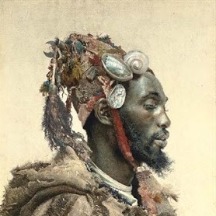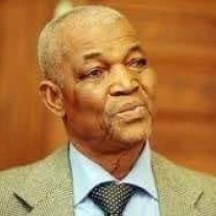

Abubakari II departed from the coast of West Africa from a site in what is now modern-day Gambia with 2,000 vessels filled with sailors, their wives, food, water, and even gold.
While we know for certain that Abubakari II never returned to reclaim his empire, a new voice has emerged with a theory about what happened to him. Malian author Gadoussou Diawara, in his book, "The Saga of Abubakari II" believes that he landed in Brazil and stayed there.
Advocates of a Black transatlantic crossing have offered a variety of evidence over the years to support their claims. And no one can take issue with Carter G. Woodson's observation in his "The Negro In Our History" first written nearly a century ago: "Inasmuch as scientists now claim there once existed on the western coast of Africa a very advanced people who influenced even the civilization of the Mediterranean world, they have little doubt of their having extended their culture across the middle passage. Africa, it will be remembered, is nearer to America than Europe."
Moreover, it is difficult to overlook the African features of the famed Olmec heads of Mexico, some with cornrow hairstyles, or the preColumbian Africoid sculptures collected by Alexander Von Wuthennau and published in his "Unexpected Faces in Ancient America," and in which he noted that "the startling fact is that in all parts of Mexico from Campeche in the east to the south coast of Guerro, and from Chiapas, next to the Guatemalan border, to the Panuco River in the Huasteca region (north of Vera Cruz) archaeological pieces representing Negro or negroid people have been found, especially in archaic or preclassic sites."
There have been similar findings at several sites in Mexico by the Polish scientist Andrzej Wiercinski. One of the pioneering works on the subject is "Africa in the Discovery of America," a three-volume magnum opus published between 1920 and 1922 by Professor Leo Weiner of Harvard University.
He uncovered an astounding array of rare quotes from early European explorers, African loan words in Native American languages, and much more. On page 365 in his third volume, he mentioned: "the presence of Negroes with their trading masters in America before Columbus is proved by the representations of Negroes in American sculpture and design, by the occurrence of a Black nation at Darien (present-day Panama) early in the XVI century, but more specifically by Columbus' emphatic reference to Negro traders from Guinea, who trafficked in a gold alloy 'guanin' of precisely the same composition having the same name as frequently referred to by early writers in Africa."
Before Weiner there was Peter DeRoo, the author of "History of America Before Columbus," who mentioned "ancient Negro arrivals" in the Americas." In the 1970s, Professor Ivan Van Sertima produced "They Came Before Columbus" and Harvard professor Barry Fell published: "America B.C." Both of which furthered the discussion of preColumbian Africans arriving in the western hemisphere. Van Sertima believed that Abubakari II, a man whose empire was larger than the Holy Roman Empire in Europe, "...sailed out of the Senegal river into the Atlantic."
He also believed that an abstract of Columbus' log made by Bishop Bartolome de las Casas appeared to indicate that one of the reasons for Columbus' third journey to the Americas was to verify the claims of King John II of Portugal that "canoes had been found which set out from the coast of Guinea and sailed to the west with merchandise" as well as statements attributed to the native peoples of the island of Hispaniola that African sailors had reached them carrying spear points made of 'guanin."
The English magazine "Historyextra," February 2020, reports that "... Diawara claims the African explorer came ashore in Brazil, somewhere very close to the spot where the city of Recife is now situated. Another name for this area is “Pernambuco,” which is state in Brazil, which supporters of this theory suggest is an aberration of the Mande, "Boure Bambouk," name for the rich gold fields that made the Mali empire so incredibly wealthy. (The Mande languages are spoken in several countries in West Africa by the Mandé peoples and include Maninka, Mandinka, Soninke, Bambara, Kpelle, Dioula, Bozo, Mende, Susu, and Vai.)
The BBC News, December 13,2000, refers to "a research project being carried out in Mali tracing Abubakari's journeys." The article relates that the scholars carrying on this type of research "say the best sources of information on Abubakari II are Griots--the original historians in Africa." Cited in the same article, Diawara says "the Griots themselves imposed a seal of silence on the story. The Griots found his abdication a shameful act, not worthy of praise...For that reason they have refused to sing praise or talk of this great African man."
Other supporters of his voyage have said they found West African loan/tribal names in parts of Brazil. One example, they claim, is the Galibis for a small tribe in Brazil from the Galibis in the Mali university town of Timbuktu. Another is Nahuatl word for sash or waist cloth which is based on the Malinke word "masiti" for the same or similar item.
While Abubakari II's voyage cannot be conclusively confirmed, there is, nevertheless, a long and glorious legacy of Black exploration. Not only in Africa but in every corner of the earth. One of my own books, "Black Explorers 2300 B.C To The Present" is a small step in that direction. But until the stories of brave, bold, and courageous African individuals like Harkhuf, Hanno, Hamilco, DuChaillu, and scores of other men and women are better known, Black history, and the world's history will be incomplete.
POH PODCAST: Feb 13, 2026 - Abubakri II’s Voyage with CR Gibbs
After publishing this article in February 2021, we finally revisited the subject audibly.






